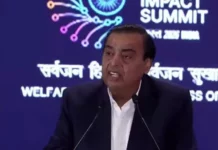WASHINGTON: The IMF on Wednesday approved a USD 6 billion loan over a period of three years for cash-strapped Pakistan, aimed at returning sustainable growth to the country’s fragile economy and improve the standards of living. Pakistan’s finance ministry approached the International Monetary Fund (IMF) in August 2018 for a bailout package when the Imran Khan government took over.
“IMF Executive Board approved today a three-year USD 6 billion loan to support #Pakistan’s economic plan, which aims to return sustainable growth to the country’s economy and improve the standards of living,” IMF spokesperson Gerry Rice tweeted on Wednesday.
The USD 6 billion financial aid includes an immediate disbursement of USD 1 billion to help Pakistan address its balance of payment crisis.
“The remaining amount will be phased over the duration of the programme, subject to four quarterly reviews and four semi-annual reviews,” the IMF said in a statement.
The IMF Executive Board “approved a 39-month extended arrangement” under the Extended Fund Facility (EFF) for Pakistan for USD 6 billion to support its economic reform programme, it said.
“The EFF-supported programme will help Pakistan to reduce economic vulnerabilities and generate sustainable and balanced growth focusing on: a decisive fiscal consolidation to reduce public debt and build resilience while expanding social spending; a flexible, market-determined exchange rate to restore competitiveness and rebuild official reserves; to eliminate quasi-fiscal losses in the energy sector; and to strengthen institutions and enhance transparency,” the statement added.
Meanwhile, Dr Abdul Hafeez Shaikh, Advisor to Pakistan prime minister on Finance, in Islamabad said the IMF’s move is a testimony of the government’s resolve to ensure financial discipline and sound economic management in the country.
In a tweet, he said the IMF granted the loan to support Pakistan’s economic reform programme.
“Our programme supports broad based growth by reducing imbalances in the economy. Social spending has been strengthened to completely protect vulnerable segments,” he said.
A structural reform agenda, which includes improving public finances and reducing public debt through revenue reforms, is the key part of the programme, Shaikh added.
Pakistan last month reached an agreement with the IMF on the bailout package after marathon talks.
Khan changed the entire economic team including the finance minister, chief of State Bank of Pakistan (SBP) and head of Federal Bureau of Revenue (FBR) under criticism for failure to improve the economy. The latest deal is the 22nd bailout package since Pakistan became member of the IMF in 1950.
Pakistan has so far received billions in financial aid packages from friendly countries like China, Saudi Arabia and the UAE during the current fiscal year.
Last month, Pakistan secured a bailout package of USD 3 billion from oil-rich Qatar.
Earlier, China gave USD 4.6 billion in shape of deposits and commercial loans and Saudi Arabia provided USD 3 billion cash deposit and USD 3.2 billion oil facility on deferred payments. The United Arab Emirates also provided USD 2 billion cash deposit. PTI






